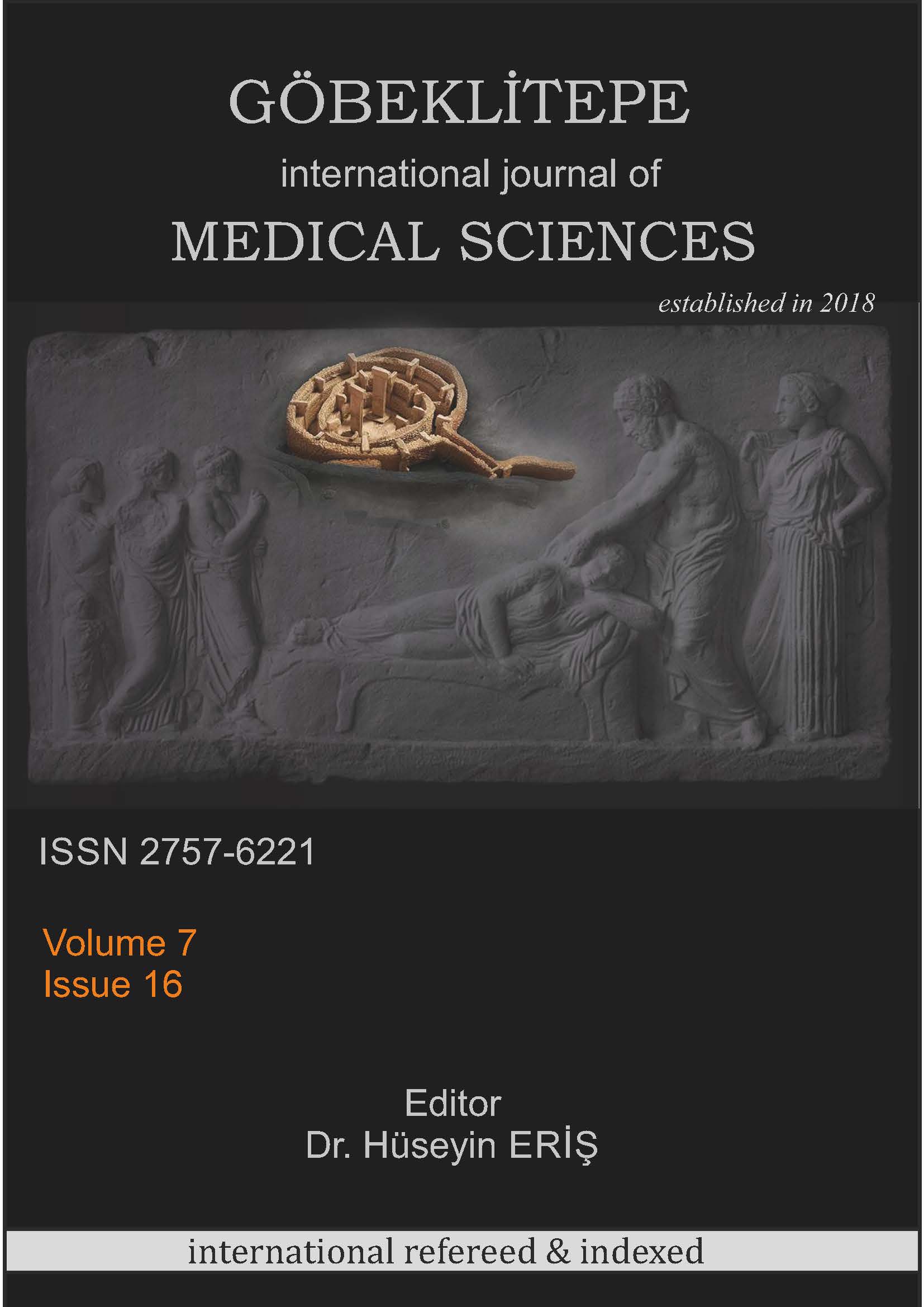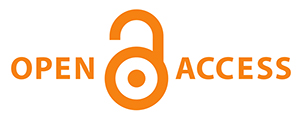THE CORRELATION BETWEEN THOUGHTS AND ANXIETY LEVELS OF THE NURSING STUDENTS ABOUT COVID-19
DOI:
https://doi.org/10.55433/gsbd/154Abstract
This study was conducted to determine the correlation between thoughts and anxiety levels of the student nurses about the new type of coronavirus (COVID-19). The descriptive study was conducted between April and May 2020 with the students studying in the Nursing Department of a Faculty of Health Sciences. While the study population consisted of all students, the sample was composed of 346 nursing students who were voluntary to participate in the study. Before starting the study, necessary permissions were obtained from the Ministry of Health, Ethics Committee, and the relevant Institution. The data were collected online with the Questionnaire and State Anxiety Inventory (SAI). The data were collected online with the Questionnaire and State Anxiety Inventory (SAI). It was determined that SAI mean scores was 46.4±9.2 and there was a correlation between SAI mean scores with the gender, chronic disease in the family, taking disinfectant, keeping food stock, obeying the call to stay at home, having stress, and believing that education and quality of life were negatively affected (p<0.05). It was found that the students experienced “moderate” level anxiety.
References
https://www.who.int/emergencies/diseases/novel-coronavirus-2019, (Access Date: 20.03.2020).
hsgm.saglik.gov.tr (Access Date: 18.03.2020).
Rokni, M., Ghasemi, V., & Tavakoli, Z. (2020). Immune responses and pathogenesis of SARS-CoV-2 during an outbreak in Iran: Comparison with SARS and MERS. Reviews in medical virology, 30(3), e2107. https://doi.org/10.1002/rmv.2107.
Kolifarhood, G., Aghaali, M., Mozafar Saadati, H., Taherpour, N., Rahimi, S., Izadi, N., & Hashemi Nazari, S. S. (2020). Epidemiological and Clinical Aspects of COVID-19; a Narrative Review. Archives of academic emergency medicine, 8(1), e41.
Uğraş, Di̇kmen., A, Kına., M, Özkan, S., & İlhan, M. (2020). COVID-19 Epidemiology: What We Learned From The Pandemic. Journal of Biotechnology and Strategic Health Research, 4,29-36. DOI: 10.34084 / bshr.715153. (Original work published in Turkish).
Fathizadeh, H., Maroufi, P., Momen-Heravi, M., Dao, S., Köse, Ş., Ganbarov, K., Pagliano, P., Esposito, S., & Kafil, H. S. (2020). Protection and disinfection policies against SARS-CoV-2 (COVID-19). Le infezioni in medicina, 28(2), 185–191.
Özlü, A., & Öztaş, D. (2020). Taking Lessons from the Past in Combating the New Corona Pandemic (Covid-19). Ankara Med J, (2): 468-481. https://doi.org/10.5505/amj.2020.46547. (Original work published in Turkish).
Choi, S. H., Kim, H. W., Kang, J. M., Kim, D. H., & Cho, E. Y. (2020). Epidemiology and clinical features of coronavirus disease 2019 in children. Clinical and experimental pediatrics, 63(4), 125–132. https://doi.org/10.3345/cep.2020.00535.
Catton H. (2020). Global challenges in health and health care for nurses and midwives everywhere. International nursing review, 67(1), 4–6. https://doi.org/10.1111/inr.12578.
Lai, J., Ma, S., Wang, Y., Cai, Z., Hu, J., Wei, N., Wu, J., Du, H., Chen, T., Li, R., Tan, H., Kang, L., Yao, L., Huang, M., Wang, H., Wang, G., Liu, Z., & Hu, S. (2020). Factors Associated With Mental Health Outcomes Among Health Care Workers Exposed to Coronavirus Disease 2019. JAMA network open, 3(3), e203976. https://doi.org/10.1001/jamanetworkopen.2020.3976.
Aslan, H., & Pekince, H. (2020). Nursing students' views on the COVID-19 pandemic and their percieved stress levels. Perspectives in psychiatric care, 10.1111/ppc.12597. Advance online publication. https://doi.org/10.1111/ppc.12597
Savitsky, B., Findling, Y., Ereli, A., & Hendel, T. (2020). Anxiety and coping strategies among nursing students during the covid-19 pandemic. Nurse education in practice, 46, 102809. https://doi.org/10.1016/j.nepr.2020.102809.
Oner, N., & Le Compte, A. (1983). State and Trait Anxiety Inventory Handbook, Istanbul: Boğaziçi University Publications. (Original work published in Turkish).
Çıkaroğlu, O. C. (2011). Investigation of Perceptions Associated with Swine Flu (H1N1) Epidemic in the Context of Variables of Anxiety and Avoidance. Turkish Journal of Psychology. 26 (67); 49-64. (Original work published in Turkish).
Taylor, M. R., Agho, K. E., Stevens, G. J., & Raphael, B. (2008). Factors influencing psychological distress during a disease epidemic: data from Australia's first outbreak of equine influenza. BMC public health, 8, 347. https://doi.org/10.1186/1471-2458-8-347.
Lau, J. T., Yang, X., Pang, E., Tsui, H. Y., Wong, E., & Wing, Y. K. (2005). SARS-related perceptions in Hong Kong. Emerging infectious diseases, 11(3), 417–424. https://doi.org/10.3201/eid1103.040675.
Goulia, P., Mantas, C., Dimitroula, D., Mantis, D., & Hyphantis, T. (2010). General hospital staff worries, perceived sufficiency of information and associated psychological distress during the A/H1N1 influenza pandemic. BMC infectious diseases, 10, 322. https://doi.org/10.1186/1471-2334-10-322.
Balkhy, H. H., Abolfotouh, M. A., Al-Hathlool, R. H., & Al-Jumah, M. A. (2010). Awareness, attitudes, and practices related to the swine influenza pandemic among the Saudi public. BMC infectious diseases, 10, 42. https://doi.org/10.1186/1471-2334-10-42.
Elrggal, M. E., Karami, N. A., Rafea, B., Alahmadi, L., Al Shehri, A., Alamoudi, R., Koshak, H., Alkahtani, S., & Cheema, E. (2018). Evaluation of preparedness of healthcare student volunteers against Middle East respiratory syndrome coronavirus (MERS-CoV) in Makkah, Saudi Arabia: a cross-sectional study. Zeitschrift fur Gesundheitswissenschaften = Journal of public health, 26(6), 607–612. https://doi.org/10.1007/s10389-018-0917-5.
Eki̇z, T., Ilıman, E., & Dönmez, E. (2020). COMPARISON OF INDIVIDUALS HEALTH ANXIETY LEVELS AND PERCEPTION OF CONTROL OF COVID-19. International Journal of Health Management and Strategies Research, 6 (1), 139-154. Retrieved from https://dergipark.org.tr/tr/pub/usaysad/issue/54067/729076. (Original work published in Turkish).
Frankenberg, E., Sikoki, B., Sumantri, C., Suriastini, W., & Thomas, D. (2013). Education, Vulnerability, and Resilience after a Natural Disaster. Ecology and society : a journal of integrative science for resilience and sustainability, 18(2), 16. https://doi.org/10.5751/ES-05377-180216.
Chang, J., Yuan, Y., & Wang, D. (2020). Nan fang yi ke da xue xue bao = Journal of Southern Medical University, 40(2), 171–176. https://doi.org/10.12122/j.issn.1673-4254.2020.02.06.
Ikhlaq, A., Bint-e-Riaz, H., Bashir, I., & Ijaz, F. (2020). Awareness and Attitude of Undergraduate Medical Students towards 2019-novel Corona virus. Pak J Med Sci. 36(COVID19-S4):COVID19-S32-S36. doi: https://doi.org/10.12669/pjms.36.COVID19-S4.2636.
Yıldırım, N., Karaca, A., Ankaralı, H., Açıkgöz, F., & Akkuş, D. (2016). Stress experienced by Turkish nursing students and related factors. Clin Exp Health Sci. 6(3): 121-128. https:// dx.doi.org/ 10.5152/ clinexphealthsci.2016.061.
Çelebi, C. (2020). Nursing Care in Patients Diagnosed with Covid-19 ”Ege Clinical Medicine Journal. 58(1)35-40). (Original work published in Turkish).
Kwok, K. O., Li, K. K., Chan, H., Yi, Y. Y., Tang, A., Wei, W. I., & Wong, S. (2020). Community Responses during Early Phase of COVID-19 Epidemic, Hong Kong. Emerging infectious diseases, 26(7), 1575–1579. https://doi.org/10.3201/eid2607.200500.
Zhang, W. R., Wang, K., Yin, L., Zhao, W. F., Xue, Q., Peng, M., Min, B. Q., Tian, Q., Leng, H. X., Du, J. L., Chang, H., Yang, Y., Li, W., Shangguan, F. F., Yan, T. Y., Dong, H. Q., Han, Y., Wang, Y. P., Cosci, F., & Wang, H. X. (2020). Mental Health and Psychosocial Problems of Medical Health Workers during the COVID-19 Epidemic in China. Psychotherapy and psychosomatics, 89(4), 242–250. https://doi.org/10.1159/000507639.
Wang, C., Pan, R., Wan, X., Tan, Y., Xu, L., Ho, C. S., & Ho, R. C. (2020). Immediate Psychological Responses and Associated Factors during the Initial Stage of the 2019 Coronavirus Disease (COVID-19) Epidemic among the General Population in China. International journal of environmental research and public health, 17(5), 1729. https://doi.org/10.3390/ijerph17051729.
Bostan, S., Erdem, R., Öztürk, Y. E., Kılıç, T., & Yılmaz, A. (2020). The Effect of COVID-19 Pandemic on the Turkish Society. Electronic Journal of General Medicine, 17(6), em237. https://doi.org/10.29333/ejgm/7944.
Naja, F., Hamadeh, R. (2020). Nutrition amid the COVID-19 pandemic: a multi-level framework for action. Eur J Clin Nutr ; 74, 1117–1121. https://doi.org/10.1038/s41430-020-0634-3.
Baker, S. R., Farrokhnia, R. A., Meyer, S., Pagel, M., & Yannelis, C. (2020). How Does Household Spending Respond to an Epidemic Consumption During the COVID-19 Pandemic. NBER Working Paper No. 26949.
Long, N. N., & Khoi, B. H. (2020). An Empirical Study about the Intention to Hoard Food during COVID-19 Pandemic. Eurasia Journal of Mathematics, Science and Technology Education, 16(7), em1857. https://doi.org/10.29333/ejmste/8207.
Çokuğraş, H., & Önal, P. (2020). SARS-CoV-2 infection in children. Turk Pediatri Ars. 55 (2): 95-102. (Original work published in Turkish).
Sandalcı, B., Uyaroğlu, O. A., Sain Güven, G. (2020). Role, Importance and Recommendations of Chronic Diseases in COVID-19 "FLORA; 25 • doi: 10.5578 / flora.69700. (Original work published in Turkish).
Altın, Z. (2020). The Elderly in the Covid-19 Pandemic. The Journal of Tepecik Education and Research Hospital; 30 (Additional number): 49-57). (Original work published in Turkish).
Onder, G., Rezza, G., & Brusaferro, S. (2020). Case-Fatality Rate and Characteristics of Patients Dying in Relation to COVID-19 in Italy. JAMA. 323(18):1775–1776. doi:10.1001/jama.2020.4683.
Bai, Y., Lin, C. C., Lin, C. Y., Chen, J. Y., Chue, C. M., & Chou, P. (2004). Survey of stress reactions among health care workers involved with the SARS outbreak. Psychiatric services (Washington, D.C.), 55(9), 1055–1057. https://doi.org/10.1176/appi.ps.55.9.1055.
Robertson, E., Hershenfield, K., Grace, S. L., & Stewart, D. E. (2004). The psychosocial effects of being quarantined following exposure to SARS: a qualitative study of Toronto health care workers. Canadian journal of psychiatry. Revue canadienne de psychiatrie, 49(6), 403–407. https://doi.org/10.1177/070674370404900612.
Üstün, Ç., & Özçi̇ftçi̇, S. (2020). Effects of the COVID-19 Pandemic on Social Life and Ethical Plane: An Evaluation Study. Anatolian Clinic the Journal of Medical Sciences, 25 (Special Issue on COVID 19), 142-153. DOI: 10.21673 / anaadoluklin.721864. (Original work published in Turkish).
Cao, W., Fang, Z., Hou, G., Han, M., Xu, X., Dong, J., & Zheng, J. (2020). The psychological impact of the COVID-19 epidemic on college students in China. Psychiatry research, 287, 112934. https://doi.org/10.1016/j.psychres.2020.112934.
Ferrel, M. N., & Ryan, J. J. (2020). The Impact of COVID-19 on Medical Education. Cureus, 12(3), e7492. https://doi.org/10.7759/cureus.7492.
Downloads
Published
Versions
- 2023-03-29 (3)
- 2023-03-29 (2)
- 2023-03-22 (1)
How to Cite
Issue
Section
License
Copyright (c) 2023 Göbeklitepe Sağlık Bilimleri Dergisi

This work is licensed under a Creative Commons Attribution 4.0 International License.




